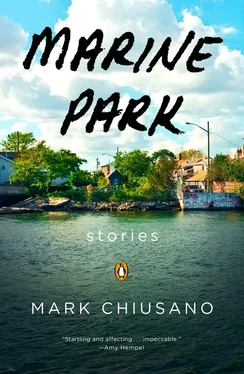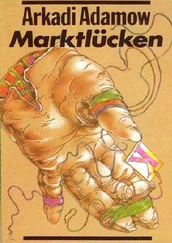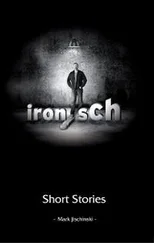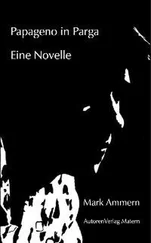Good Shepherd was not a big church, though it wasn’t a small one. It wasn’t particularly well decorated. There was a large skylight stained-glass window up over the altar, which was supposed to be the crowning work of art, but looked strangely geometrical and out of place, almost like an Islamic mosaic. Mrs. Favero had once felt strongly that the boys go to church. Her mother had been like that. But it began to feel less and less important. Just the year before one of the deacons was accused of improper sexual conduct. I knew it, Lorris had crowed, over the phone. He had already been at college. He always used to look at me funny, Lorris said. Mr. Favero had put an end to such jokes quickly. Enough, he said. The small bronze font for holy water at the front of the church was almost empty, and the ground was squeaky and damp around it, when the Faveros crossed themselves. They sat in the back row, because it had been so difficult parking. Lorris had only seen a coffin once before. The new priest, from some foreign country, stood up.
Later, at the house next door, everyone said what a nice service it had been. Genine Denton, the wife, was nodding quickly, her chin jutting out too far. People had said such nice things, Lorris heard someone say. He heard someone say, almost excitedly, I didn’t know he went to Midwood! I didn’t even know Midwood existed back then. The Stanton family was all there, showing the new family the ropes. No one played whiffleball on the corner of Thirty-Fourth and R, where the green sign was, the Fire Captain Thomas J. Stanton memorial corner. I didn’t know his firehouse had been so close to the World Trade Center, a woman near Lorris gasped. The closest one, someone else answered. Make it through that and then. Lorris shook Tyler Denton’s hand, but Tyler walked away before he could say much. Eventually Mrs. Denton went with Mrs. Favero next door, where they put the food that wouldn’t fit in their fridge into the Faveros’. Then she sat on the couch next to Mrs. Favero. They talked about when their children used to play in the living room there. Mrs. Favero asked if she remembered Legos. Mrs. Denton said that she did. Mr. Favero came in the door with his hands in his pockets looking for them. He stood in front of the couch. He suddenly didn’t know what to do.
That night, after they’d changed out of their good clothes, the ones they’d had in closets in plastic bags, they sat down to watch television. Mr. Favero had been on the couch there since dinner. He hadn’t done the dishes. There wasn’t enough room for all of them on the couch, so Jamison lay on his stomach on the floor. He was laughing at the sitcoms. After the news, Mrs. Favero asked the boys to take the recycling out. Jamison looked at her strangely. Dad always takes the recycling out, he said. He was leaning up on his elbows. You could do something around here sometime, she snapped. Jamison got up and Lorris went with him.
They lugged the white bags out of the trash cans, in the backyard, dragged them around the alleyway and out to the front. Lorris noticed that the tree, in the backyard, looked even more like a face than it usually did — like one of those children’s movies where inanimate objects come alive.
Check out the tree, Lorris said, while they passed it. The face.
Jamison looked at it. I never notice it, he said.
They put the recycling where it belonged, matching the rest of the white bags in front of the other houses. Lorris watched the grease from the tomato cans color the bottom of his bag. He thought about how long it would take to pool through the bottom. Jamison took out his cell phone, wiped his hands on his pants before touching the screen.
Who’s that? Lorris asked.
A girl, Jamison said.
You’re so full of it, Lorris said. You make it like it’s a different girl every day. Show me the text.
I’m not showing you anything.
Here, Lorris said, and reached for the phone. Jamison jerked it away, finished the text, and put it back in his pocket. Give it up, Jamison said. He started walking up the stairs to the house. When he got to the top of the stairs he said, Maybe we can play some baseball this weekend, before you leave. He looked back at Lorris like he was waiting for an answer, so Lorris said, Course. Jamison went in and the door banged. It made Lorris feel good. Jamison was back and forth like that all the time. While Jamison went in, Lorris saw an upstairs light go off in the Dentons’ house.
It was still light out, and warm. It would almost be summer. Lorris checked to see if the screen door stayed unlocked and walked up Avenue R, toward Flatbush. He didn’t even have a sweatshirt on. There were no spaces between the houses here, as there weren’t until right by Flatbush, after which they changed back again. They grew into each other on both sides. Most of them were painted red. Lorris wondered if someone had planned the houses out beforehand, or if they shot up in perfect rows. Suddenly he felt claustrophobic, the way he sometimes did on bus rides, when the ride was too long and it was already dark outside the window. There would be the cars flashing by on the other side of the highway, sometimes a gas station and lit-up rest stops, but that was it. The emptiness made him feel restless. That’s how his legs felt, like even if he wanted to he couldn’t get up. Tomorrow he would take the bus back to college.
On Quentin Road, in front of the supermarket, Lorris leaned back against a fire hydrant. A man on the same side of the street was washing his car. He was scrubbing with a thick sponge. Lorris watched him twist the material in his hand. There was a bucket of water on the ground next to him, the water sloshing against the edges. The hose next to the sidewalk was leaking and getting Lorris’s shoes wet. The man worked over the same point on the car for a long time, and then he leaned his forehead on the hood and kept pressing, not looking. The metal at the top of the fire hydrant was biting into Lorris’s leg, but he felt that it would be the most impossible thing in the world for him to leave just then.
We were heading out to buy a Christmas tree off Knapp Street. I thought we used to go to Marine Park, Lorris said. Tuh, said our mother. We never went there, she said. We haven’t been there in years, she amended — They’re too expensive. I thought I remembered always going to Marine Park to get our Christmas tree when we were kids, even after — sawdust on the ground, a pile of old cut-up trees in the corner of the parking lot, which would stay there until spring, when the Parks Department trucked them away: same weekend they dragged the baseball fields — but I guess I was wrong. My mother, a school secretary, is nothing if not together. Since Lorris has been in college she’s been substituting in math. I’m in the basement, which has its own bathroom, just for a while. My father just kept driving. Is this Katy Perry? he asked Z100.
Avenue R forks like an ornament hook, and we went left onto Gerritsen. You follow that far enough, you get to the end of the world, where Brooklyn drops into the water, where the houses are small and waterproof. We used to play baseball there, Lorris and me, in socks too big for our feet. Across the street from the diamond is the library, where I went a few days ago, sick of nostalgia. Lorris and I had driven over together, talking about our problems. He had become too introspective, in my opinion. Enough thinking about what was wrong. Just do something instead. Lorris nodded like he tends to, but I don’t think he was satisfied. You can’t make someone be satisfied by telling them.
The tree was easy this year. They didn’t have many left. Got any Fraser firs? our mother asked. We always buy Fraser firs, she confided to the tree attendant in an elf hat. Good trees, he said, the felt ears jangling. Every year, she said. What about this little one? my father said, pointing at a Charlie Brown — size one. It was small and squat, wilting in the warm, unseasonable weather.
Читать дальше











